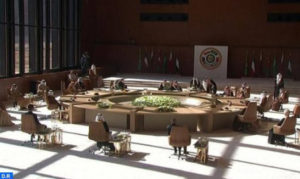 The leaders of the Gulf Cooperation Council member countries called, on Tuesday, for intensifying efforts to implement the joint action plans provided for under the strategic partnership binding them to Morocco.
The leaders of the Gulf Cooperation Council member countries called, on Tuesday, for intensifying efforts to implement the joint action plans provided for under the strategic partnership binding them to Morocco.
This came in the Final Declaration adopted by the 41st Summit held Tuesday in the Saudi historic city of Al-Ula, under the chairmanship of Crown Prince of Saudi Arabia, Mohamed Bin Salman, on behalf of his father.
The Al-Ula Declaration highlighted the importance of the specific strategic partnership between the Gulf Cooperation Council (GCC) and the Kingdom of Morocco, and called for stepping up efforts to implement the joint action plans provided for under the strategic partnership between the two parties.
The Declaration also reaffirmed the firm positions and decisions of the Gulf States in favor of the sovereignty and territorial integrity of Morocco, expressing their support for the measures taken by Morocco to restore civil and commercial movement in the buffer zone of Guerguarat, in the Moroccan Sahara.
The Gulf state leaders also rejected any actions or practices that would affect the flow of movement in the Guerguarat crossing point.
The Al-Ula summit marks the end of the blockade imposed on Qatar since June 2017 by a Saudi-led coalition including the UAE, Bahrain, plus Egypt.
Actually, the Final Declaration of the 41st GCC summit meeting states that the GCC leaders will continue the march of unity and cooperation in order to achieve common interests to serve their peoples, tighten their cooperation, and consolidate security and stability in the region.
In this connection, Morocco has expressed hope that the GCC 41st summit would lead to the reunification of the countries of the region, rebuild mutual trust, and foster unity between the council’s members.
In a statement released Tuesday evening, the Foreign Ministry underlined the relations of sincere consideration and strong ties binding King Mohammed VI and his brothers, the leaders of the Gulf countries, and expressed Morocco’s hope to see the initiatives made at the 41st summit lead to the reunification of the countries of the region, the rebuilding mutual trust and the consolidation of unity between these countries.
Morocco also welcomed the positive development of relations between Saudi Arabia and Qatar as well as the signing of the Al-Ula Declaration, said the statement.
Morocco likewise commended the efforts conducted by Kuwait that made this reconciliation possible, as well as the constructive role played by the United States in this regard.
At the end of the GCC summit, diplomatic relations between Qatar and the four countries that had boycotted it for more than three years were fully restored.
At the opening of the summit, the GCC countries signed an agreement “of solidarity and stability” to ease tensions between Qatar and its neighbors, mainly Saudi Arabia, the UAE, Bahrain and also Egypt.
The Summit took place in the presence of Sheikh Nawaf Al-Ahmad Al-Jaber Al-Sabah, Emir of Kuwait, Sheikh Tamim Bin Hamad Al Thani, Emir of Qatar, Crown Prince of Bahrain, Salman Bin Hamad, Oman’s Deputy Prime Minister, Fahd Bin Mahmoud Al Said and Sheikh Mohammed Ben Rashid Al Maktoum, Vice President of United Arab Emirates.
The event was also attended by Secretary General of the Organization for Islamic Cooperation, Yusuf Ben Ahmed Al-Uthaimin, Secretary General of the League of Arab States, Ahmed Aboul Gheit, Egyptian Minister of Foreign Affairs, Sameh Choukri and White House Senior Adviser Jared Kushner.
